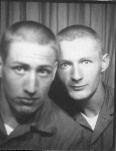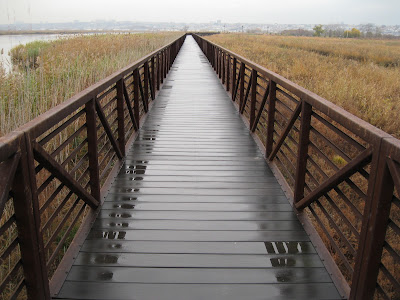Chapter 2: Escape along memory lane
A chill air blew down Crooks Avenue from the east, yet snow
had not yet arrived, leaving the slate sidewalk at the bottom of my front
stairs clear, as was the street itself, parked cars lining the curb, including Harold’s
Cadillac and Ritchie’s carpentry truck. A block of stone and a small concrete
post stood at the curb from another era before the horseless carriage, where
people mounted and dismounted from the back of carts pulled by horses.
I paused brief porch steps to catch my breath with two sets of
stairs leading to the slate walk at the bottom, the wooden porch steps and the
concrete ones below those, with grass slopes to either side, and a concrete
retaining wall at the bottom which has served me as The Alamo, Mount Everest
and a host of other imaginary places when I was young. The yellowed grass on
the slopes reminded me of the chore I had promised to complete, overgrown weeds
stooping over like abandoned wheat.
My heart still raced, but not nearly as bad as it had inside
when Ritchie tried to get into the bathroom. This only reminded me of
approaching dawn and the likelihood that one or more of my uncles might rise
early and catch wind of my crime.
I clamored down wooden porch steps, they sagging under each
footfall, despite the four or five times my grandfather had rebuilt them over
the years, weathering badly, and now with my grandfather more than two years
dead, no one willing to keep up the repair – my uncles consumed with making
money, not spending it on anything so mundane as steps nobody but the mailman
used (other than someone delivering bad news such as the death in the family.)
I patted my pockets at the lumps of their money – smug at
the thought my somehow sending them a message about greed when down deep I knew
I was little more than a thief.
My hand ran along the rusted pipe that served as a rail, flakes
of old paint coming off in my palm, the cold metal making me shiver, even after
I reached the bottom and stared back at the old house I never expected to see
again, at the large pine trees my grandfather had planted to either side of the
porch stairs that first Christmas after the family had moved into the house in
1946, sentinels to serve as a last remembrance of his eventually success, long
forgotten by his offspring, and barely remembered from his telling me later.
A brief regret touched me then, not over the theft, over the
small things that always reminded me of my grandfather and how I would not have
them as reminders later wherever I eventually ended up. Of all things, I would
miss them the most – even the fading yellow paint and dark windows that always
made me think of closed eyes. The windows to my mother’s bedroom looked down at
me from above the porch. I turned away, hurrying west along Crooks Avenue along
a route I had taken for most of my life, the icons of growing up rising out of
the dark – the Brett house next door, in which the Brett’s no longer lived
after the passing of their father – each daughter married off except the
youngest, and young William destined for a corporate career at a water plant in
some remote part of New England, then passed Dr. Fraulo’s house, where Little
Davy lived, and his big brothers, Lou and Nick, and a back yard nearly as large
as a football field where we frequently played, passing even now with a cringe
the dog pens where the good doctor had kept a pair of long deceased ferrous dogs,
and then the parking lot to the shoe factory where we used to play soldier,
lobbing rocks as hand grenades through the dusty windows until the cops made us
stop.
The thought playing soldier seemed a little ridiculous now
after the year spent doing the real thing and having seen so many survivors
dying in the Fort Dix hospital. Yet nobody actually died in our games, always
brought back to life for the next battle, none having the death look I had seen
in the eyes of men wounded slowly fading into unconsciousness, filled with
memories too horrible for me to imagine, yet which had made me vow not to follow
in their footsteps and to keep myself from getting sent to Vietnam.
Beyond the shoe factory was another factory that changed
hands yearly, a contractor this year when last year it had been a printing
house. It seemed to be the only thing in the old neighborhood that changed,
other than the store under Dave’s old apartment near Vernon – which had been a
storefront A&P when I was very young to which my grandmother sent me to
fetch freshly ground bags of coffee and ground beef, where I stood in amazement
as the butcher pushed the chunks of meat into one end and shreds came out the
other end like long red worms. Long gone, the place was currently occupied by a
jeweler.
Leon from the drug store at Vernon and Crooks, an old man
when I was very young, had died, his business taken over by some stranger named
Allie, modernized, no longer the dark place we used to go to get buy candy –
the old man getting angry when we sometimes imitated the Chunky candy commercial
by knocking our knuckles on his counter and demanding the candy in high pitched
voices.
We still called the place Leon’s. We just didn’t go there
anymore.
I crossed Vernon and paused in front of the liquor store
where Dave and I had frequently purchased clear cream soda whenever we could
find or still enough to pay for it. My shoelaces had come undone. I bent and
retied them, for the first time thinking about the possibility of police, who
would no doubt strange seeing a man in a thin brown tweed suit wandering around
in the cold in the dead of night.
I hurried on, passing the jewelry store and the door to Dave’s
apartment next to it, and the dilapidated old fire escape I had once climbed up
to shut off an air conditioner Dave had left on, part of some aborted plan for
us to go to the shore without his mother being aware of it. When Dave moved to
Paterson, my whole life changed. We had been Batman and Robin, causing havoc throughout
the neighborhood. But without him, I felt lost, even though I continued to see
him, walking the twenty blocks to his new home. It was never the same.
And each step I took along that route was so drenched with
memories and familiar faces, I struggled to focus, Lee’s Tavern on the Clifton side,
facing off against Paul’s Tavern on the Paterson side, White Leaf Cleaners
across the street from Dave’s, the homes of classmates such as Vincent Grady
part of the long line of old houses on the Paterson side, finally bringing me
to the sweet shoppe near the tracks where I had picked up newspapers for my
route – one of my failed attempts at capitalism. And with each step, I glanced
back, expecting pursuit, relieved when none showed, and yet growing more
nervous, as if this might have been an illusion, police or my uncles waiting in
the shadows to snag me at any moment. I felt a bit better when I crossed over
the tracks, stepping out of my old neighborhood into familiar yet not home
ground near Getty Avenue and then Main, where I halted and waited in front of
the gas station for the bus to New York City to come – which just didn’t come.
At this point, I realized the folly of my plan. What kind of
burglar committed a robbery and then relied on public transportation for his getaway?
I must have waited nearly an hour with the clock ticking
like a time bomb in my head, predawn was ending, rear dawn reared over me, lighting
the sky, with me shivering against the cold, staring down Main Street into
Paterson for a bus that did not come. Again, I felt exposed, standing there on
the street, looking utterly suspicious to any cop that happened by. I also
worried about my early rising uncles. I had left Harold’s pants in the front hall,
and the cash box in the hamper. If discovered, my uncles would soon be
searching the neighborhood for me, and I imagined them riding up Crooks Avenue
to find me standing there, still waiting for a bus.
At that point, I gave up on the bus and decided to call for
a cab.



Comments
Post a Comment